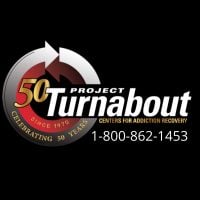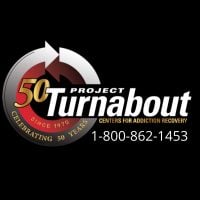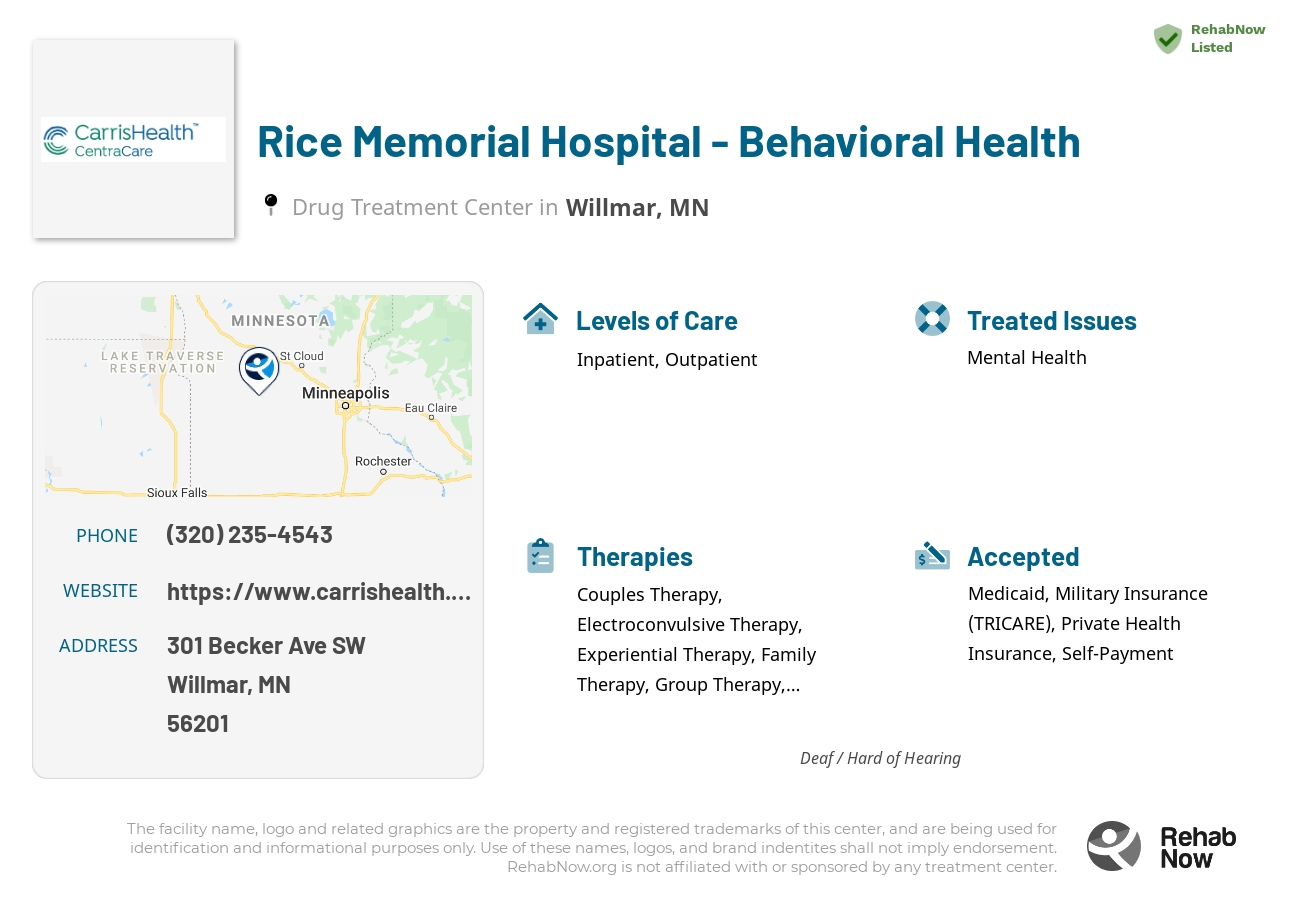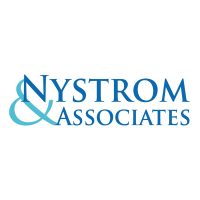
Rice Memorial Hospital - Behavioral Health
Drug Rehab Center in Willmar, Minnesota
- Mental Health
Rice Memorial Hospital Behavioral Health provides comprehensive care for individuals struggling with mental health issues, offering inpatient and outpatient treatment options with a range of evidence-based therapies, personalized treatment plans, and accepts a variety of private health insurance plans.
About This Minnesota Facility
Rice Memorial Hospital in Willmar, Minnesota, specializes in mental health and substance use disorder treatment for a diverse clientele. This facility stands out for utilizing evidence-based methods to address a broad spectrum of mental health, behavioral, and substance abuse problems with a focus on intensive outpatient programs, medication-assisted treatment, and smoking cessation programs.
- Evidence-Based Treatment - Utilizes scientifically proven methods in individual and group sessions to ensure effective recovery.
- Medication-Assisted Treatment - Offers FDA-approved medications combined with comprehensive counseling for opioid withdrawal and long-term sobriety.
- Flexible Scheduling - Provides an evening program for those with daytime commitments, ensuring accessibility to treatment for a wide audience.
Rice Memorial Hospital is accredited by JCAHO, highlighting its commitment to maintaining high-quality care standards. The facility offers a rich variety of treatment options, focusing on the importance of individual and group therapy in a patient’s recovery journey.
The center treats a range of addictions and mental health conditions, including opioid dependency, anxiety, depression, and other psychiatric challenges, using medication-assisted treatment and intensive outpatient care to support recovery.
Genders
Ages
Modality
Additional
Conditions and Issues Treated
Levels of Care Offered at Rice Memorial Hospital - Behavioral Health
This center offers a variety of custom treatment tailored to individual recovery. Currently available are Inpatient, Outpatient, with additional therapies available as listed below.
Inpatient treatment centers offer a safe, secure, and often medically supervised environment for drug or alcohol-addicted individuals. Many of these facilities are equipped to provide detoxification, treatment for co-occurring mental health disorders, and aftercare programs. The patient typically spends 28 to 30 days at the facility and will receive extensive drug counseling.
An outpatient treatment program is set up to help with alcohol or drug addiction or a co-occurring disorder. The patient must attend the facility for their therapy and other programs but can return home each night.
The frequency of mandatory attendance decreases after much of Rice Memorial Hospital - Behavioral Health‘s program is complete.
Outpatient treatment is a recovery approach that allows recovering addicts to live at home while getting rehab for addiction
An outpatient can include day treatments which include attending group sessions one hour per week. A person living in an outpatient environment may be allowed the opportunity to work full time if they choose to and continue studies without interruption from drugs/alcohol.
Outpatient treatment is an option for people who want to maintain their careers and families. Outpatients live at home but attend treatment such as individual counseling, group counseling, or twelve-step meetings during the day.
Therapies & Programs
At Rice Memorial Hospital - Behavioral Health , to learn from past mistakes and improve one’s situation, the recovering person meets individually with a therapist. The counselor or therapist will address addiction causes, triggers, mental issues, dual diagnosis, and aftercare plans during this time. This is a very intense and challenging process. Some clients find it easier to open up to someone other than family or friends who understand their struggles with addiction.
Couples therapy sessions are typically used to help couples in recovery from drug addiction work through their issues. These types of sessions can be beneficial for many reasons, including the fact that they add a layer of accountability when both partners in a couple are recovering from addiction.
Therapy can also provide addicts with another effective way to cope with stress and avoid relapse during difficult situations. This type of therapy can help improve communication with their partners, which can strengthen the relationship and prevent future problems that might lead to relapse.
Family therapy is a crucial part of drug treatment and getting sober. It is one of the most effective ways to help addicts stay on the path to long-term sobriety. An addict’s family can play a vital part in helping them to avoid relapse. They can spot the warning signs and help them get back on track.
In group therapy, recovering addicts meet with a therapist and other people in recovery. Some groups are closed, meaning only people who share the same addiction or problem can attend. Others are open to anyone who wants to stop using drugs or drinking alcohol. Group therapy sessions typically focus on one topic each week or month so that recovering addicts can discuss issues they face daily.
Cognitive Behavioral Therapy (CBT) is based on the idea that how we feel, think and act all interact together. It helps people explore their thoughts for problems (or false beliefs) that influence their mood and actions. CBT is very goal-oriented, which means that the therapist and patient work together on a specific problem. In addition to helping a client focus on thoughts that can be changed, CBT also allows them to take an active role in their treatment. Our thoughts determine our feelings and behaviors; our feelings affect our thoughts, and our behaviors change our thoughts and feelings.
Nutrition therapy has been used to help drug addicts for decades. Many early reports on addiction treatment indicate that some patients recovered from the “satisfying power of food”. For years, this phenomenon has been utilized as a treatment modality in eating disorders for adults, adolescents, and children.
Specific nutrients have been identified that influence neurotransmitters associated with reward pathways of the brain. Studies have shown that carbohydrate loading with complex carbohydrates to elevate serotonin levels was effective in treating bulimia nervosa. This approach prompted researchers to explore the use of this type of nutritional intervention in other disorders.
The goal of nicotine replacement therapy is to provide a safe alternative for people trying to quit smoking. It does this by giving small doses of nicotine that help manage cravings while breaking habits associated with cigarettes.
Nicotine Replacement Therapy (NRTC) uses products like skin patches and gum that deliver low-dose nicotine, which prevents cravings in those quitting. This makes it easier for them to make a gradual transition from smoker to non-smoker.
Patient Experience
Experiential Therapy at Rice Memorial Hospital - Behavioral Health
Experiential Therapy is a different way of thinking about addiction treatment. It uses physical activities to help work through troubling emotions, memories, and trauma that are sources of psychological issues like addiction.
Experiential Therapy can be an effective option for those who have struggled with past traumas or challenges associated with life decisions such as drug use. The non-traditional approach helps people deal more effectively with these struggles. It also allows them to gain new perspectives on their behavior patterns by recreating experiences in healthy ways rather than continuing old habits that may no longer serve them.
Payment Options Accepted
For specific insurance or payment methods please contact us.
Is your insurance accepted?
Ask an expert, call (888) 674-0062
Additional Details
Specifics, location, and helpful extra information.
Willmar, Minnesota 56201 Phone Number(320) 235-4543 Meta DetailsUpdated April 15, 2024
Staff Verified
Patient Reviews
There are no reviews yet. Be the first one to write one.
Willmar, Minnesota Addiction Information
Minnesota is fighting an opioid epidemic that is leaving hundreds of its residents dead each year. Both prescription opioids and illicit opioids are widely abused in the Land of 10,000 Lakes. Heroin continues to be one of the most commonly abused drugs in the state, if not the most common illicit drug. Over 10% of all treatment admissions in Minnesota list heroin as their drug of choice.
Over 10% of the population in Willmar, Minnesota is abusing drugs or addicted to them. 12,099 individuals entered treatment for alcohol as the primary drug of abuse in 2016. Inpatient and outpatient treatment facilities are available, as well as 12-step programs and faith-based programs.
Treatment in Nearby Cities
- West Saint Paul, MN (96.1 mi.)
- Loretto, MN (69.0 mi.)
- Nevis, MN (128.0 mi.)
- Lakeville, MN (94.2 mi.)
- New York Mills, MN (98.0 mi.)
Centers near Rice Memorial Hospital - Behavioral Health



The facility name, logo and brand are the property and registered trademarks of Rice Memorial Hospital - Behavioral Health, and are being used for identification and informational purposes only. Use of these names, logos and brands shall not imply endorsement. RehabNow.org is not affiliated with or sponsored by Rice Memorial Hospital - Behavioral Health.



